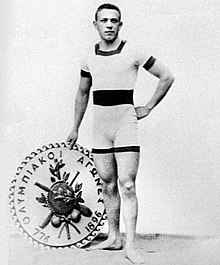GAME 2: WHO WAS PIERRE DE COUBERTAIN?
ANSWERS GAME 1: LLUC: SWIMMING.

Alfréd Hajós, the first Olympic champion in swimming, is one of only two Olympians to have won medals in both sport and art competitions.
For Alfréd Hajós of Hungary, being on the same day meant he could only compete in two of the events. He won the two events in which he swam, the 100 and 1200 meter freestyle. Hajós later became one of only two Olympians to win a medal in both the athletic and artistic competitions, when he won a silver medal for architecture in 1924. The 500 meter freestyle was won by Austrian swimmer Paul Neumann, who defeated his opponents by more than a minute and a half. Source: Wikipedia
What are the Olympic games?
A multisport international competition. Done every four years. Organized by the International Olympic Committee. They have worldwide audience.
THANK YOU POL CANOSA VIDAL!!! YOU DID A GREAT JOB!!!
A joke. Thanks Ester
GAME 1: CAN YOU TELL ME THE OLYMPIC SPORTS?
ANSWERS:
LLUC:
ATHLETICS
LLUC:
ATHLETICS
Athletics is an exclusive collection of sporting events that involve competitive running, jumping, throwing, and walking. The most common types of athletics competitions are track and field, road running, cross country running, and race walking. The simplicity of the competitions, and the lack of a need for expensive equipment, makes athletics one of the most commonly competed sports in the world. Athletics is mostly an individual sport, with the exception of relay races and competitions which combine athletes performances for a team score, such as cross country.
Organised athletics are traced back to the Ancient Olympic Games from 776 BC, and most modern events are conducted by the member clubs of the International Association of Athletics Federations. The athletics meeting forms the backbone of the modern Summer Olympics, and other leading international meetings include the IAAF World Championships and World Indoor Championships, and athletes with a physical disability compete at the Summer Paralympics and the IPC Athletics World Championships. Source: wikipedia.
The International Association of Athletics Federations, the sport's governing body, defines athletics in five disciplines: track and field, road running, race walking, cross country running, and mountain running.All forms of athletics are individual sports with the exception of relay races. However, athletes' performances are often tallied together by country at international championships, and in the case of cross country the finishing times of the top athletes from each team or country are combined to declare a team victor.
Track and field:
A typical track and field stadium with an oval running track and a grassy inner field
| Track | Field | Combined events | |||||
|---|---|---|---|---|---|---|---|
| Sprints | Middle-distance | Long-distance | Hurdles | Relays | Jumps | Throws | |
| 60 m 100 m 200 m 400 m | 800 m 1500 m 3000 m | 5000 m 10,000 m | 60 m hurdles 100 m hurdles 110 m hurdles 400 m hurdles 3000 m steeplechase | 4×100 m relay 4×400 m relay | Long jump Triple jump High jump Pole vault | Shot put Discus throw Hammer throw Javelin throw | Pentathlon Heptathlon Decathlon |
- Note: Events in italics are competed at indoor world championships only
Road running:
Cross country running:
Racewalking:





